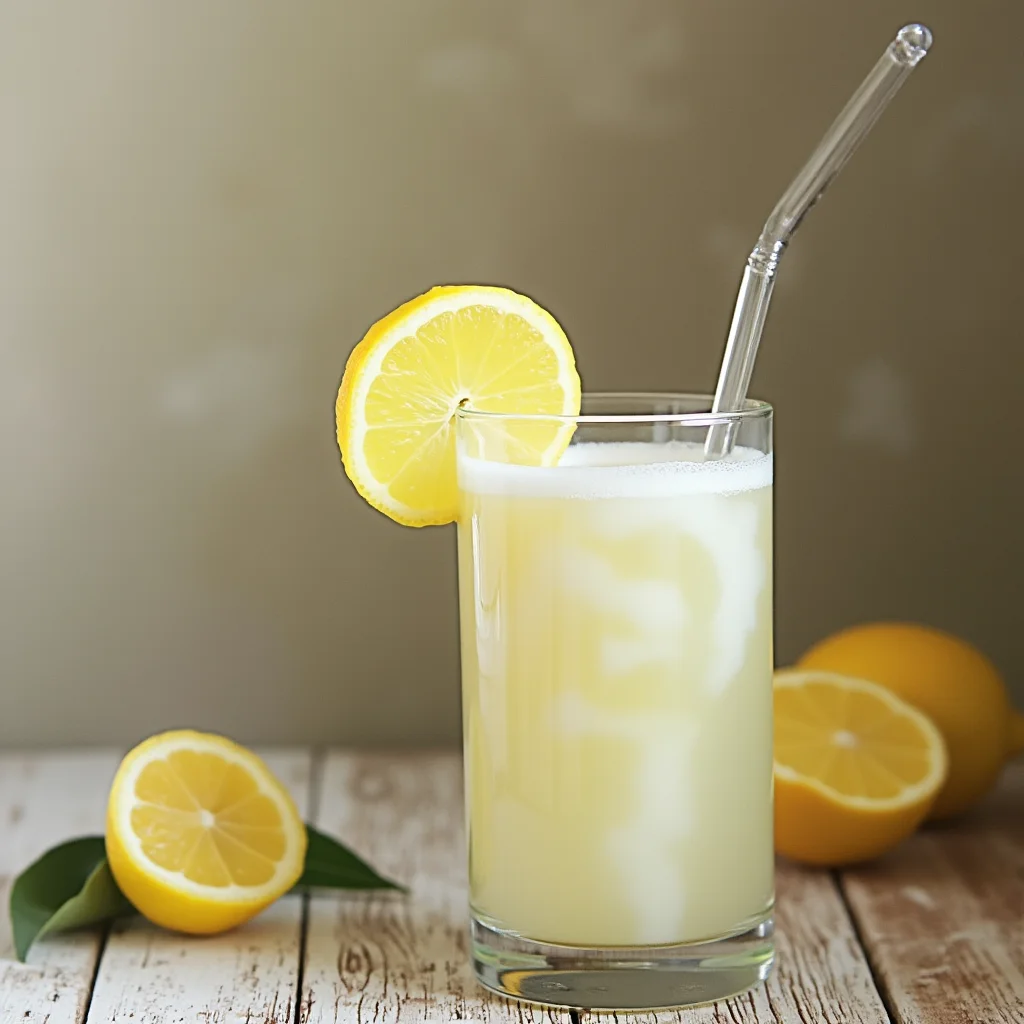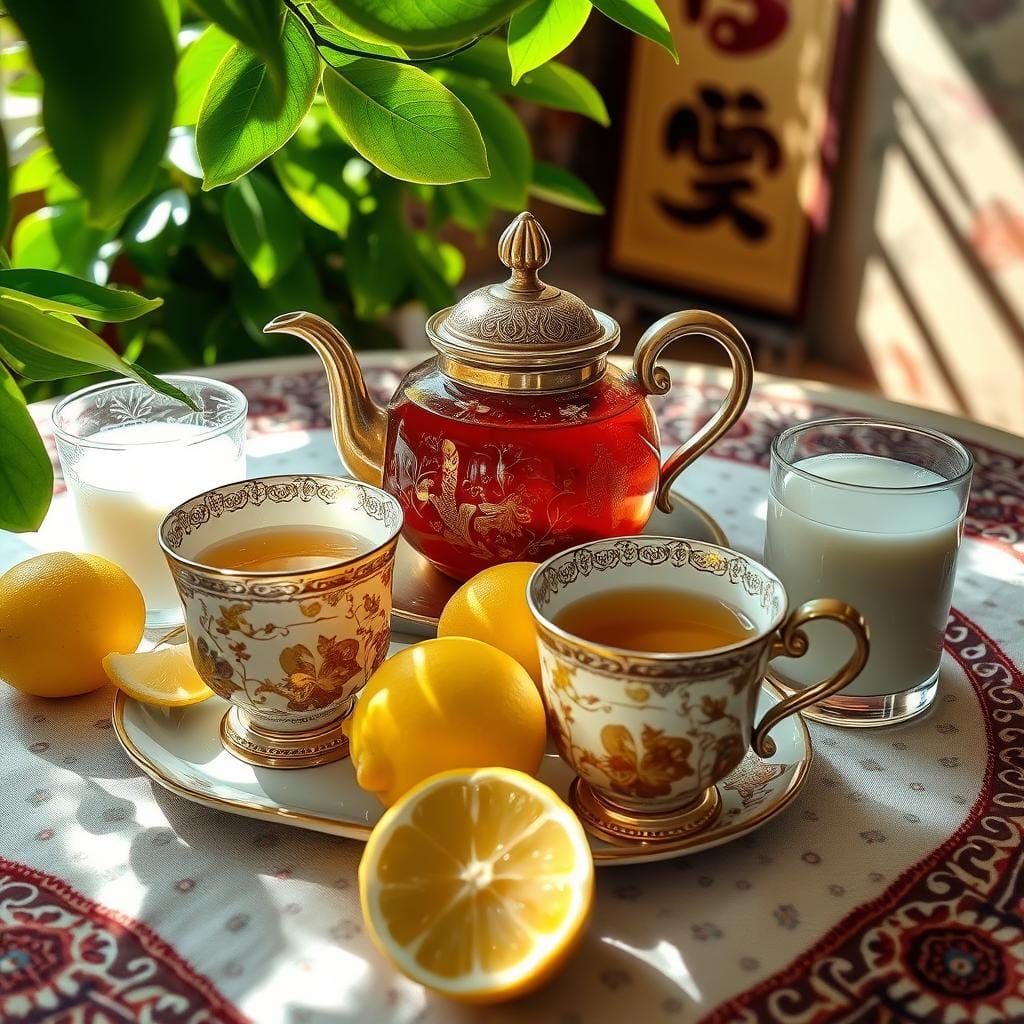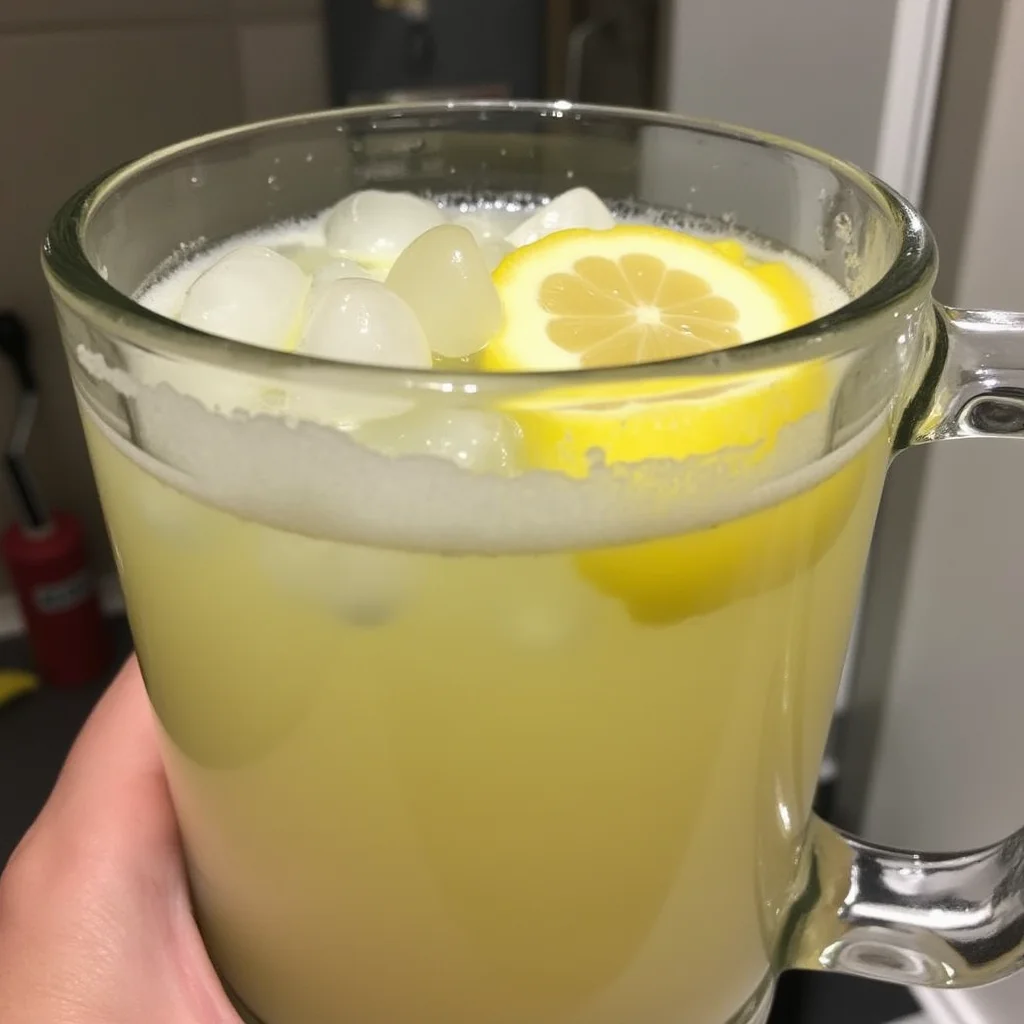Can you mix lemon 🍋 with milk as tea? I once nervously added lemon to my milk tea, unsure of the outcome. That moment opened my eyes to a world of new and exciting tea flavors.
Lemon milk tea is more than a drink; it’s an adventure. People often question if it’s good, but the answer is more complex. This guide will explore the science and culture behind it, showing you how it can change your tea experience.
We’ll look at the chemistry and global traditions of tea. Whether you’re a home cook or a tea enthusiast, get ready to see lemon milk tea in a new light.

Key Takeaways
- Lemon and milk tea combinations offer unique flavor profiles
- Chemical interactions between citrus and dairy create complex taste experiences
- Temperature and mixing technique significantly impact final beverage quality
- Cultural traditions influence tea preparation methods
- Experimenting with different milk types can enhance your tea experience
Understanding the Science Behind Mixing Citrus and Dairy
Exploring flavored milk beverages in the kitchen? Knowing how lemon 🍋 and milk mix is key. This mix-up is a cool chemical dance that changes taste and texture.

Mixing lemon with milk is a complex science. It’s about how acids and proteins interact. Your question about mixing lemon 🍋 with milk as tea? opens up a world of molecular magic.
Chemical Reaction Between Acid and Proteins
When lemon acid meets milk proteins, something special happens. The acid makes the proteins change shape:
- Protein molecules start to unfold
- Hydrogen bonds break down
- Structural changes start the curdling process
pH Levels and Curdling Effects
The pH level is very important when mixing lemon with milk. If it’s too acidic, the milk proteins clump together. This causes the milk to separate.
| pH Level | Milk Protein Reaction |
|---|---|
| 6.7 (Neutral) | Stable milk proteins |
| Below 4.6 | Protein denaturation begins |
Temperature Impact on Mixture Stability
Temperature also plays a big role in how lemon and milk mix. Higher temperatures speed up protein denaturation, making curdling more likely.
“The dance between acid, protein, and temperature creates a delicate molecular ballet” – Food Science Researcher
The History and Cultural Significance of Lemon Milk Tea
Lemon-infused drinks have a rich history across cultures and continents. The mix of milk tea and lemon has grown from traditional methods to a worldwide favorite.

The roots of milk tea variations lie in different regions with unique cultural practices. In Asia, especially Taiwan and Hong Kong, tea lovers have always been open to new drink ideas.
“Tea is the elixir of life, and when combined with lemon and milk, it becomes a cultural experience.” – Tea Historian
- Traditional Chinese tea preparation influenced early milk tea recipes
- British colonial tea traditions introduced milk to tea drinking
- Southeast Asian cultures developed unique tea blends
As cultural exchanges grew, unique tea blends emerged. Traders and travelers shared ingredients and techniques, turning simple drinks into complex culinary delights.
| Region | Tea Variation | Key Characteristics |
|---|---|---|
| Taiwan | Bubble Tea with Lemon | Sweet, tangy, chewy texture |
| India | Masala Chai with Lemon | Spicy, refreshing, aromatic |
| United Kingdom | Classic Milk Tea | Creamy, subtle lemon notes |
Today, lemon-infused milk tea is more than a drink. It stands for cultural exchange, creativity in food, and the world’s food traditions coming together.
Can you mix lemon 🍋 with milk as tea?
Exploring new tea recipes can be exciting. Mixing citrus drinks with dairy might sound strange. But, it offers a unique taste for those who love trying new things.
Immediate Effects When Combining
Mixing lemon with milk causes some cool changes. The lemon’s acidity can make the milk’s proteins separate. This might make your tea look a bit curdled, but it’s not always bad.
- Rapid protein separation
- Potential texture changes
- Unique flavor transformation
Safety Considerations
Think about safety before trying this mix. The tea’s temperature is key to avoid too much curdling. Use milk that’s room temperature or a bit warm when adding lemon.
“The art of tea is a delicate balance between science and creativity” – Tea Enthusiast
Taste Profile Analysis
The taste of lemon and milk is quite complex. You’ll get a tangy, creamy feel that’s both refreshing and rich. Some find it a fancy twist on regular tea.
- Initial citrus brightness
- Creamy dairy undertones
- Balanced acidic-sweet finish
Pro tip: Start with small amounts to find the right mix of citrus and dairy in your tea.
Best Types of Milk to Use for Lemon Tea Combinations
Choosing the right milk can make your lemon tea better. Different milks add unique flavors and textures. This makes your drink both tasty and fun.
When looking for flavored milk beverages, here are the top picks for lemon tea:
- Whole Milk: Creamy texture with rich flavor
- Almond Milk: Nutty undertones with light consistency
- Oat Milk: Smooth, slightly sweet profile
- Coconut Milk: Tropical hint with distinctive taste
Your choice of milk greatly affects the taste of your milk tea. Each milk interacts with lemon in its own way. This creates different flavors.
| Milk Type | Flavor Profile | Recommended Tea Style |
|---|---|---|
| Whole Milk | Rich, Creamy | Traditional Lemon Black Tea |
| Almond Milk | Light, Nutty | Green Tea Blend |
| Oat Milk | Smooth, Sweet | Herbal Lemon Infusion |
| Coconut Milk | Tropical, Distinct | Exotic Tea Combinations |
“The secret to perfect lemon milk tea lies in understanding how different milks interact with tea and citrus.” – Tea Master’s Guide
Pro tip: Always use fresh milk and the right temperature. This prevents curdling when mixing with lemon.
Proper Techniques for Mixing Citrus and Dairy in Tea
Making the perfect lemon-infused drinks needs precision and knowledge. When you mix lemon 🍋 with milk tea, pay close attention. This ensures a smooth and tasty drink.
Temperature Control Methods
Temperature is key when mixing lemon 🍋 with milk tea. Here are some important tips:
- Cool your tea slightly before adding lemon juice
- Aim for a lukewarm temperature around 104°F (40°C)
- Avoid adding lemon to boiling hot milk
Mixing Order Importance
The order of ingredients is crucial for a great lemon milk tea. Tea experts suggest:
- Brew tea first
- Let tea cool slightly
- Add milk
- Gently stir in lemon juice
“Patience is key in creating the perfect lemon-infused tea blend.” – Tea Mastery Journal
Timing Considerations
| Step | Recommended Time | Purpose |
|---|---|---|
| Tea Brewing | 3-5 minutes | Extract full flavor |
| Cooling Period | 2-3 minutes | Prevent protein curdling |
| Lemon Addition | Immediately before serving | Maintain fresh citrus notes |
Learning these techniques can turn your kitchen experiments into expert-level lemon milk tea.
Alternative Methods to Enjoy Lemon and Milk Tea
Exploring new ways to make milk tea can change how you enjoy it. You’ll find fun ways to mix lemon and milk that go beyond just adding them together.
Trying different milk tea recipes can make your tea time better. Here are some cool tea blends and ways to serve them:
- Layered Lemon Milk Tea Presentation
- Serve tea and milk separately
- Add lemon slice as a garnish
- Allow personal mixing at the table
- Infusion Techniques
- Steep lemon zest in milk before adding tea
- Create lemon-infused milk syrup
- Use cold brew methods for smoother flavor
“The art of tea is about experiencing flavors, not just consuming them.” – Tea Master
For those who love innovative serving methods, here are some cool ways to present your tea:
| Method | Flavor Profile | Preparation Complexity |
|---|---|---|
| Chilled Lemon Milk Tea Shooter | Refreshing, Tangy | Easy |
| Deconstructed Lemon Milk Tea | Complex, Customizable | Moderate |
| Lemon Milk Tea Foam Topping | Creamy, Zesty | Advanced |
By trying these new methods, you’ll discover new tastes and make your tea time exciting.
Health Benefits and Potential Risks
Lemon milk tea is a mix of good and caution. It’s a drink that can boost your health but also has things to watch out for. This drink is a blend of citrus and dairy, which affects your health in different ways.
Looking into lemon milk tea’s nutrition shows it’s good for you in many ways. The mix of citrus and dairy has health benefits and things to think about.
Nutritional Value Assessment
Lemon milk tea has many health benefits:
- Vitamin C from fresh lemons boosts your immune system
- Calcium from dairy strengthens your bones
- Antioxidants fight off cell damage
Digestive Considerations
It’s important to know how lemon milk tea affects your stomach. The acidity in lemons might affect how your body absorbs protein from dairy.
| Digestive Factor | Potential Impact |
|---|---|
| Acidity Level | May cause mild stomach discomfort for some |
| Protein Interaction | Possible reduced protein absorption |
| Lactose Sensitivity | Could lead to digestive problems for those who can’t digest lactose |
Allergies and Sensitivities
Think about allergies before trying lemon milk tea:
- Dairy allergies can be serious
- Citrus can cause mild to severe reactions in some
- Everyone reacts differently
“Know your body’s unique response to lemon milk tea” – Nutrition Expert
Talking to a doctor can help you add lemon milk tea to your diet safely and enjoyably.
Creative Recipes for Lemon-Infused Milk Tea
Exploring unique tea blends can change how you enjoy drinks. Mixing lemon-infused drinks with creamy milk is a great idea. These recipes will help you make tasty milk beverages at home.
Start your culinary adventure with these exciting lemon milk tea variations:
- Lavender Lemon Milk Tea: Steep lavender buds with black tea, add fresh lemon juice, and finish with a splash of warm milk
- Honey Ginger Lemon Milk Tea: Combine grated ginger, honey, fresh lemon zest, and creamy milk for a warming blend
- Matcha Lemon Milk Tea: Whisk high-quality matcha powder with lemon juice and smooth milk for a vibrant green drink
“The art of creating perfect lemon-infused drinks lies in balancing flavors and temperatures.” – Tea Master
For making great milk tea, use fresh ingredients. Control how long you steep the tea. Try different milks like almond or oat milk to find your favorite mix.
When mixing citrus with dairy, temperature is key. Add lemon juice slowly. Avoid big temperature changes to stop curdling in your tea.
Expert Tips for Perfect Lemon Milk Tea
Making lemon milk tea is all about precision and creativity. It’s a mix of kitchen experiments and tea recipes that need attention to detail. Tea experts share their insider knowledge to help you get it right.
“The secret to a perfect lemon milk tea is understanding the delicate balance between acidity and creaminess.” – Professional Tea Sommelier
Tea specialists have some key tips for a great lemon milk tea:
- Choose high-quality loose-leaf tea as your base
- Use fresh, room-temperature lemons for the best flavor
- Keep milk at the right temperature to avoid curdling
- Try different types of milk
Here are some professional techniques for your tea recipes:
| Technique | Recommended Method |
|---|---|
| Lemon Addition | Add after milk, slowly stir |
| Milk Selection | Whole milk or oat milk preferred |
| Steeping Time | 3-5 minutes maximum |
Pro tip: Always strain your tea to ensure a smooth, refined texture in your lemon milk tea.
As you practice these expert tips, your kitchen experiments will get better. Remember, making the perfect lemon milk tea is an art that takes patience and practice.
Conclusion
Exploring lemon milk tea is a journey into the mix of cooking science and creative drink making. It’s a chance to try new flavors and mix citrus drinks with dairy. This blend is unique and exciting.
To make great lemon milk tea, you need to balance acid and protein, control the temperature, and know what you like. It might seem tricky at first, but you can learn to mix these ingredients well. This knowledge lets you try new things with confidence.
Think of making lemon milk tea as a fun adventure. Begin with small amounts, focus on how you mix them, and feel free to change things up. It’s a refreshing drink and a way to try new things in the world of food and drinks.
Finding the perfect lemon milk tea is all about personal discovery. By being open to learning, trying new things, and adjusting your approach, you can turn this interesting drink into your own special treat.


2 thoughts on “Can you mix lemon 🍋 with milk as tea? Guide & Tips”